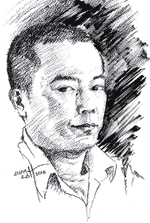
| By YENI | Monday, July 5, 2010 |
The people of Burma love to gamble, which leads to entertainment pleasure for the masses, a few lucky winners and many social ills. There is one game in Burma, however, that the masses will not find very entertaining, only the junta stands to win and is certain to perpetuate most of the country's social problems: the coming election.
Burma is known as "the land of gold," which may be true for the ruling class of military generals who enrich themselves by selling off the country's gas, timber, jade and other natural resources. But the junta's mishandling of the economy means that people at the bottom of society struggle desperately, and one of the few escapes from their miserable daily existence is gambling.
 |
| Yeni is news editor of the Irrawaddy magazine. He can be reached at [email protected]. |
A Rangoon-based economist calculated that gambling transactions in Burma through the two-digit lottery alone could be worth approximately five to ten billion kyat (US $5-10 million) a day.
Currently, all gambling eyes in Burma are focused on the World Cup competition. Burma has a more permissive attitude towards sports book and sports betting than neighboring countries, so even though football gambling is illegal, people gamble publicly.
According to Burmese law, anyone caught gambling or taking bets could receive a prison sentence of between three months and two years, but the ability to bribe most policemen and administrative officials has allowed illegal gambling to thrive in the world's third most corrupt country, as ranked by Berlin-based Transparency International in 2009.
The ease with which people in Burma place bets is drawing outside interest as well. It is believed that Chinese and Thai sports bookmakers are now setting up gambling operations in Burmese border towns, where they can build a network of illegal gambling inside Burma.
For those who live below the poverty line, there appears to be nothing to loose by gambling, except perhaps a bamboo shelter with a tarpaulin roof. But in Burma, where the illegal gambling industry’s profits are based on a large number of addicted gamblers, including the poor who run up relatively huge debts, the often hidden social costs of gambling are incalculable.
There is substantial evidence that gambling can lead to addictive and destructive behavior, much like alcohol and drugs. Ultimately, problem gamblers cause a net loss to the community that includes increased crime, lost work time, personal bankruptcy, domestic violence, child abuse and financial hardships to family members.
According to a report from Integrated Regional Information Networks (commonly known as IRIN), a part of the UN Office for the Coordination of Humanitarian Affairs, even Burmese children can become involved in paying off gambling-related debts—parents often take their children out of school and send them to work in return for credit from the bookmakers.
The tentacles of black money have affected every corner of society in Burma, making it almost impossible under current conditions to effectively curb illegal gambling businesses or even to set up a social safety net of programs such as public and private awareness campaigns, child protection services or micro-finance programs.
This is one more reason why Burma needs to launch a new beginning, replacing the current unelected regime with dynamic, effective political leadership elected to national and state parliaments through free and fair democratic polls. Unfortunately, the junta's proposed elections may be the most rigged game in town, and participation the riskiest bet.
Webster's New World Dictionary defines “gambling” as playing a game of chance for money or some other stake, or taking a risk in order to gain some advantage. In a “fair game,” the expected value is at least equal to the stake.
Some argue that even with the odds stacked against the opposition, reform in Burma can begin at the margins, then move into the mainstream once a more level playing field is established in the future. In their view, a reversion to real democracy should not be expected immediately. Therefore, they say, opposition and ethnic politicians, as well as voters, should take a gamble and participate in—rather than complain about—the regime’s “road map” and so-called election, accepting for now whatever trickles down from the ruling military elite in hopes of winning a big payoff in the future.
But under the junta's house rules, the big payoff may never materialize. This means that unless the rules are changed to make the coming election free and fair, members of the opposition are destined to toss their energy, resources, credibility and even lives into the junta's rigged political slot machine with no hope of ever winning the jackpot of real democracy. And that is not a fair game.